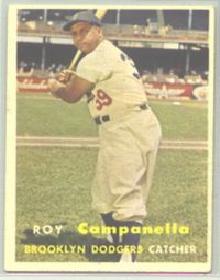






 |  |  |  |  |  |  |

Like many blacks, he played winter baseball in Latin America while he was with the Giants. Because he had two children, Campanella was granted a draft deferment during World War II. He went to the Mexican League in 1942 but returned to the Giants in 1944.
When Branch Rickey of the Brooklyn Dodgers was looking for a black player to integrate major league baseball, Campanella was among those considered. Jackie Robinson, of course, was chosen for that role, but Campanella also signed with the Dodgers soon afterward, in 1946.
After two seasons in the minor leagues, Campanella was with the Dodgers briefly at the beginning of the 1948 season. He was sent down to the minors, primarily to integrate the American Association, but was called back up for good after hitting 13 home runs in 35 games.
"Campy" played for four pennant winners in Brooklyn and was named the NL's most valuable player in 1951, 1953, and 1955. He hit .325 with 33 homers and 108 RBI in 1951. In 1953, he set a record for catchers with 41 home runs, led the league with 142 RBI, and batted .312. When the Dodgers won their first world championship in 1955, Campanella batted .318 with 32 home runs and 107 RBI.
Though known for his quiet demeanor off the field, Campanella could take charge on the field. A Dodger pitcher once shook off his sign and gave up a hit. Campanella told him angrily, "Don't ever shake me off again. You know I'm smarter than you are."
In the early morning of January 28, 1958, Campanella was driving from his Harlem liquor store to his home on Long Island when his car skidded on a patch of ice and hit a telephone pole. He suffered two broken vertebrae in his neck and was paralyzed from the chest down.
The Dodgers moved to Los Angeles that year. Campanella was honored on May 7, 1959, before an exhibition game between the Dodgers and the Yankees. A record crowd of 93,103 fans turned out to pay tribute to him.
Campanella served as a spring training coach for the Dodgers for many years. His autobiography, It's Good to Be Alive, was adapted as a 1974 made-for-television movie.

 |  |  |  |  |  |  |